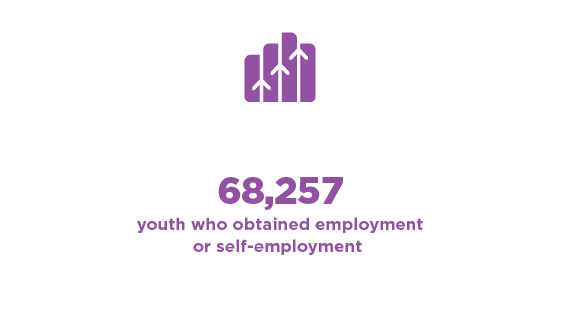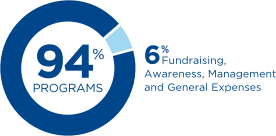Our Work Around the world
In a world facing the serious consequences of violence, natural disasters, poverty, and disease, CRS and our partners and supporters bring lifesaving and life-affirming support to where it is needed most. In 2022, our efforts reached more than 255 million people across 122 countries. CRS is on the ground, living our faith through our work. From supporting refugees who have fled conflict in places like Ukraine to addressing the hunger crisis in East Africa, and from finding farming solutions in Central America’s dry corridor to sowing the seeds of peace wherever it is absent
— CRS is committed to building a better world.
Ambitious Goals, Record Impact
Introduced in 2020, CRS Global Results demonstrate how each program, country and region contributes to our global impact, making our process transparent and accountable. These numbers allow us to measure how we are achieving desired outcomes and how our work across all programs adds up to transformational change at scale.
 Follow this icon for the 2022 Global Results in each goal area.
Follow this icon for the 2022 Global Results in each goal area.
Refugees Build Community in Egypt
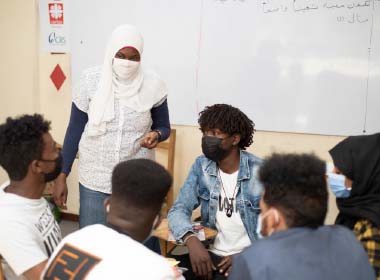 An atmosphere of division and distrust pervades the area of Ain Shams, an economically vulnerable neighborhood in Cairo with one of Egypt’s highest concentrations of refugees. Hundreds of thousands from Sudan and South Sudan have found refuge in Egypt but remain segregated from their host community in daily activities and educational settings, adding to tensions.
An atmosphere of division and distrust pervades the area of Ain Shams, an economically vulnerable neighborhood in Cairo with one of Egypt’s highest concentrations of refugees. Hundreds of thousands from Sudan and South Sudan have found refuge in Egypt but remain segregated from their host community in daily activities and educational settings, adding to tensions.
CRS works to decrease these divisions by supporting refugees and Egyptian host community members to build relationships of mutual trust. In the Ain Shams neighborhood, CRS has helped South Sudanese students and their parents access safe and quality education opportunities through a process called binding, bonding and bridging.
CRS works to decrease these divisions by supporting refugees and Egyptian host community members to build relationships of mutual trust. In the Ain Shams neighborhood, CRS has helped South Sudanese students and their parents access safe and quality education opportunities.
Integrating social and educational activities has allowed refugees and Egyptian host community members to deeply engage with one another. Young leaders have grown in resilience, becoming self-reliant members of their communities. Amid the challenges that accompany this changing environment, CRS remains committed to playing a significant role in establishing a more cohesive and peaceful society.
CRS supports refugees and Egyptian host community members to build relationships of mutual trust.
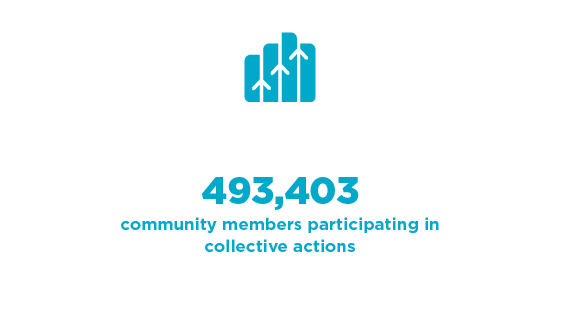
A Model of Hospitality for Ukrainian Refugees
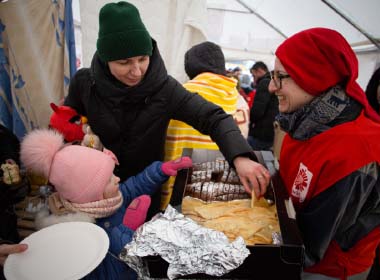
Since the Russian invasion of Ukraine in February 2022, Ukrainians have faced shortages of food, shelter and electricity, as they suffer increasing trauma and loss. More than 6 million people are displaced within the country, and more than 7 million have crossed the border into neighboring countries, where many residents have taken Ukrainians into their homes for a few days, nights, and even months.
“We are all together, like a big family,” says Edward, a Moldovan resident who has been hosting a Ukrainian mother and her daughter. “People don’t run away from good conditions. They run away from bad conditions and that’s why we have to help them.”
Almost 90% of refugees are women and children. Olga has found shelter in the house across the street from Edward. “At the moment, we only rest,” she says. “The only thing that was in our heads when we fled was to save the lives of our children.”
CRS supports Caritas partners in ten countries to aid displaced Ukrainians and refugees. Together, we can deliver comprehensive assistance to meet immediate needs and provide longer-term solutions—including support for those who are integrating elsewhere or returning home.
Says Edward, “I am ready to offer my full heart to those who need it.”
If we have the possibility to welcome people, we have to welcome. Good people are always found by God.
—Edward, a Moldovan resident
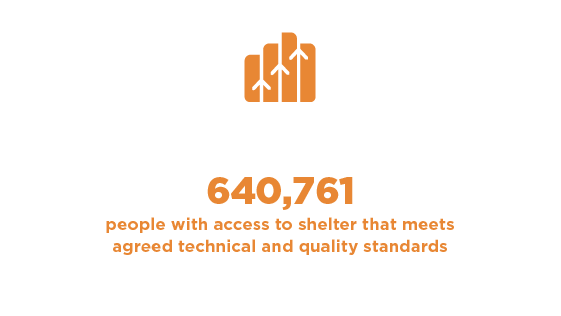
Building Resilience From the Ground Up
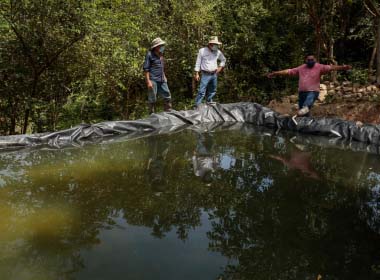
Rising temperatures, erratic rainfall patterns and recurrent drought have pounded the Dry Corridor, a strip of territory that runs through Guatemala, El Salvador, Honduras and Nicaragua, depleting harvests and leaving millions hungry in recent years.
In Honduras, Eulalio Amaya Orellana, a farmer and father of five children, has struggled to provide food for his family in the face of climate change.
“The summers are very strong,” he says. “I planted but I could not harvest due to a lack of water. The temperatures dried out our plants.”
CRS has worked with local partners to implement Restorative Agriculture in Critical Ecosystems (RAÍCES), a project funded by the U.S. Agency for International Development with the aim to help farmers build resilience. For Eulalio, that resilience starts with protecting his most vital resources: soil and water.
With the help of RAÍCES Eulalio built a water reservoir and drip irrigation system. This has allowed him to start growing vegetables that require more water to grow—such as cucumber, celery, parsley and watermelon—but fetch a better price.
The project has also connected Eulalio to a local government association that buys food for school meals from local vendors.
Jesús Martínez, an agronomist with an implementing partner, says, “Linking small-scale farmers to markets not only reduces rural poverty and hunger, it’s key for long-term resilience.”
Today with all the soil samples, we are already seeing higher yields, and the harvests are more profitable.
—Eulalio Amaya Orellana, a farmer in Honduras
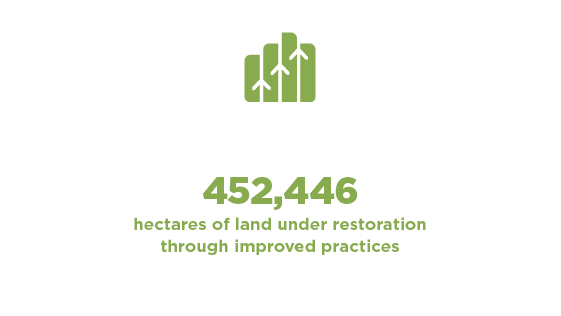
Strengthening Families in COVID-19’s Aftermath
With millions of caregivers lost to COVID-19 in India, Sruti and her children Swati and Bhaskar were not alone in struggling to face each new day, shaped by grief.
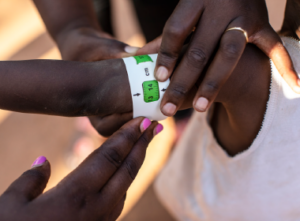
When Sruti’s 4-year-old daughter was a baby, Sruti’s husband, Anil Kumar, worked for a private company while Sruti cared for their two young children.
Then in May 2021, Anil Kumar contracted COVID-19, went to the hospital for care and never returned home.
The family was left in a precarious financial situation in the face of their heart-rending loss. Sruti was terrified she might need to send her children to an orphanage just to ensure they received adequate food and shelter.
Fortunately, as part of an emergency response with support from CRS’ Changing the Way We Care project and our partners in India, Sruti could continue caring for her children in their home.
Under this project, children who have lost one or both parents to COVID-19 receive financial assistance and food support. The cash and rations have kept families together.
I feel confident that someone is there for my family.
—P. Sruti, a mother in India
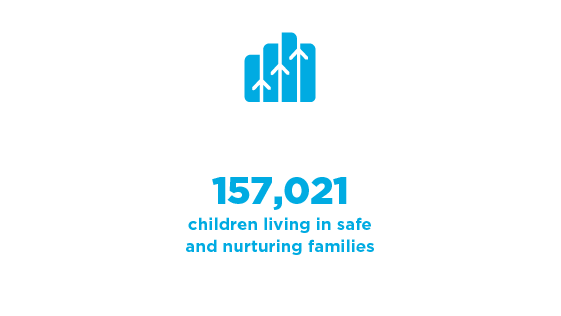
Niger Youth Project Launches Work Opportunities
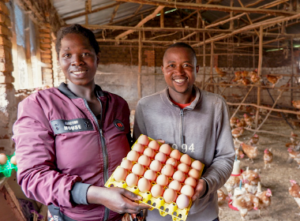
Haouaou Haroua 26 year old mother, could barely meet her daily financial needs. But Hoaouaouhad been nourishing a longtime passion for building a plant nursery—work she saw her father doing since she was a child. So, when she was selected in 2020 to be part of a CRS entrepreneurship project offering young people training in various agricultural areas, she knew exactly what area she would choose—nursery management and plant grafting.
The “Work Ready Now!” and “Be Your Own Boss” trainings are part of the Girma project, funded by the U.S. Agency for International Development and developed by Girma’s partner, the Education Development Center. It trains young people in the development of life skills, literacy and community services.
After the “Work Ready Now!” and “Be Your Own Boss” training, Haouaou established her nursery. And she encouraged other young people—especially young girls— to embrace this work.
“At first, I thought nursery work is men’s profession, but I come to know that women can do it too,” she says. “Thanks to this activity, I satisfy my needs, help my husband and my mother while taking care of my child. With my savings, I was able to buy three goats worth $80 and join a savings group where I save 35 cents every week.”
The project had taught me everything, and I plan to train other young people to make this activity sustainable.
—Haouaou Harou, a mother in Niger
